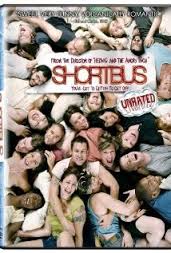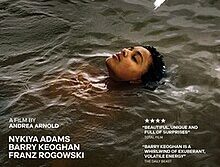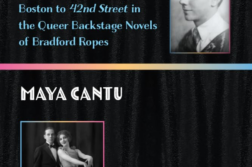 Shortbus
Shortbus
Written and directed by John Cameron Mitchell
JOHN CAMERON MITCHELL has discovered a secret and he wants to share it with you. It is this: sex is good for what ails you. Whatever your problem—loneliness, a failed marriage, crippling shyness coupled with voyeurism, repressed lesbianism, suicidal depression—all you have to do is go to a sex club, have a few heart-to-heart conversations, watch some drag performers, and get laid; and then life will be rosy. A brass band will play for you—literally—and you can sing along with everybody else.
Shortbus is a classic ensemble movie, a genre as old as talking pictures if not older. Seemingly random characters find their lives intersecting in unexpected ways. Drama turns to comedy and back, melodrama to farce. Then they all come together in the same locale. Think Grand Hotel, Dinner at Eight, or Ship of Fools. Or even It’s a Mad, Mad, Mad, Mad World—except that these characters are searching not for a Big W but the Big O.
So we meet James and Jamie (Paul Dawson and PJ DeBoy), a gay couple looking for a third guy to spice up their relationship; Ceth (Jay Brannan), the cute model they zero in on; Sofia (Sook-Yin Lee), a married sex therapist whose husband Rob (Raphael Barker) has never given her an orgasm; et al. Through various circumstances they all end up at the sex club together, a place called Shortbus.
Absurd as this premise is, it might have worked. But to make this kind of scenario click requires an exceptionally tight script, strong acting, and clear direction to hold it all together. The credits indicate that Mitchell developed his characters in collaboration with the actors, who drew on their own lives, which is to say the writing isn’t exactly focused. Should filmmaking be a kind of group therapy exercise? The acting is mostly dull, the action predictable, and even the “surprise twists” have an unhappy air of familiarity.
As for the much-hyped sex scenes, well, they are explicit, but they’re more embarrassing than erotic and they do nothing to illuminate who the characters are. What, after all, do we learn about James by seeing him suck himself off and shoot in his face that we couldn’t have learned from a few lines of pointed dialog delivered by a good actor? Would Grand Hotel be a better film if we actually saw John Barrymore screw Greta Garbo?
Mitchell’s idea of a sex club lies off in some cinematic never-land, part Eyes Wide Shut, part David Lynch dream world (complete with Lynch’s trademark red drapes). It hardly needs to be said that it’s always a mistake to remind the audience of greater directors. In the midst of all this, the characters talk. And talk. The talk is all about feelings and relationships, more Oprah than Guccione. Do Manhattanites really frequent sex clubs to work out their personal problems? This reviewer has been to his share of New York City sleaze joints and has never seen even one patron cry in another’s arms about the lack of love in his life.
Then there are the characters themselves. They are, to the last one, so superficial that it’s hard to describe. Not one of them seems to have a life independent of sex. None of them ever talks about anything but sex and relationships—not about their careers, not about the arts, or politics, or even day-to-day city life. Since most of them are gay or lesbian, this marks a glum return to a pre-Angels in America world where gay people didn’t have anything on their minds but “love” in its various permutations. Granted, some East Village denizens aren’t notable for their substance, but making a feature-length film about people like these—and expecting an audience to care about them—seems a fairly questionable proposition.
The film’s climax (so to speak), with that brass band marching through the club and all the patrons singing along, is more than a little baffling. There have been more preposterous movies in the annals of filmdom, to be sure, but Shortbus deserves special recognition for making sex and love seem just plain silly.
John Michael Curlovich is the author of The Blood of Kings (2004) and Blood Prophet (2006), both published by Alyson.





